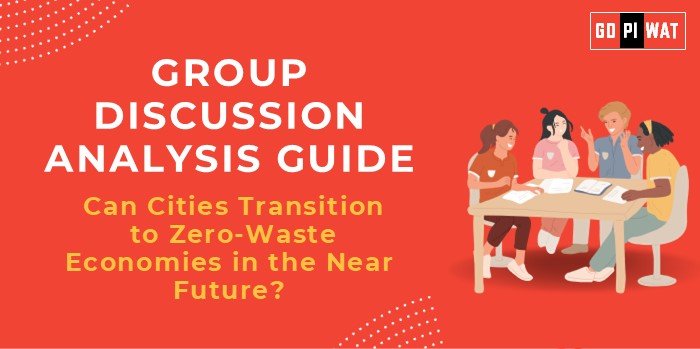🌆 Group Discussion (GD) Analysis Guide
Can Cities Transition to Zero-Waste Economies in the Near Future?
📋 Introduction to the Topic
Opening Context: Cities are responsible for generating 70% of global waste, making the zero-waste initiative vital for sustainability. With urban populations rapidly increasing, transitioning to a zero-waste economy is a critical and timely goal.
Topic Background: A zero-waste city aims to eliminate waste through sustainable consumption, reuse, recycling, and composting. The concept gained momentum with global initiatives like the Zero Waste International Alliance (ZWIA) and cities such as San Francisco and Kamikatsu setting benchmarks.
📊 Quick Facts and Key Statistics
- Global Waste Generation: 2.01 billion tonnes annually; projected to increase by 70% by 2050 (World Bank).
- Recycling Rates: Europe leads with 47%, while regions like South Asia lag at 11%.
- Economic Benefits: The circular economy model could generate $4.5 trillion by 2030 (Accenture).
- City Benchmarks: San Francisco diverts 80% of its waste; Kamikatsu aims for 100% by 2030.
🔑 Stakeholders and Their Roles
- Governments: Policy creation, funding infrastructure, and awareness campaigns.
- Corporations: Innovating sustainable packaging and adhering to Extended Producer Responsibility (EPR).
- NGOs & Citizens: Promoting awareness, grassroots participation, and behavioral changes.
- International Bodies: Setting standards and providing technical and financial support.
✅ Achievements and Challenges
Achievements:
- San Francisco: Diverted 80% of waste through composting and recycling.
- Sweden: Waste-to-energy plants process 99% of household waste.
- Kerala, India: Successfully implemented decentralized waste management.
Challenges:
- Lack of segregation infrastructure in developing cities.
- High initial investment in waste management systems.
- Resistance to behavioral change among urban populations.
Global Comparisons:
- Success: Singapore’s waste-to-energy approach and circular economy strategies.
- Challenges: Rapid urbanization in African cities exacerbating waste issues.
Case Studies:
- Kamikatsu, Japan: Zero-waste policies focusing on 45 waste separation categories.
- Indore, India: Ranked as India’s cleanest city due to its composting and waste segregation success.
🛠️ Structured Arguments for Discussion
- Supporting Stance: “Cities can transition to zero-waste economies by leveraging technology, public-private partnerships, and successful global models.”
- Opposing Stance: “Achieving zero-waste in cities faces insurmountable barriers, including economic constraints and insufficient awareness.”
- Balanced Perspective: “Transitioning to zero-waste economies is achievable, but only through incremental, community-driven, and policy-supported efforts.”
💡 Effective Discussion Approaches
Opening Approaches:
- Quote the economic potential of circular economies.
- Reference successful models like San Francisco or Kamikatsu.
Counter-Argument Handling:
- Highlight long-term economic benefits to counter cost concerns.
- Use behavioral change case studies to address societal resistance.
📈 Strategic Analysis of Strengths and Weaknesses
- Strengths: Rising global awareness of sustainability; proven models in developed cities.
- Weaknesses: Limited waste infrastructure in developing nations; policy enforcement challenges.
- Opportunities: Integration of smart waste management technologies; employment generation in recycling and waste management.
- Threats: Resource constraints in low-income cities; consumer resistance to changing lifestyles.
📚 Connecting with B-School Applications
- Real-World Applications: Projects in sustainability management, waste-to-energy ventures, or green supply chains.
- Sample Questions:
- “What policies would you recommend to accelerate zero-waste goals in cities?”
- “How can corporate CSR initiatives contribute to zero-waste economies?”
- Insights for B-School Students:
- Explore the circular economy as a potential dissertation topic.
- Study the role of behavioral economics in driving sustainability.


